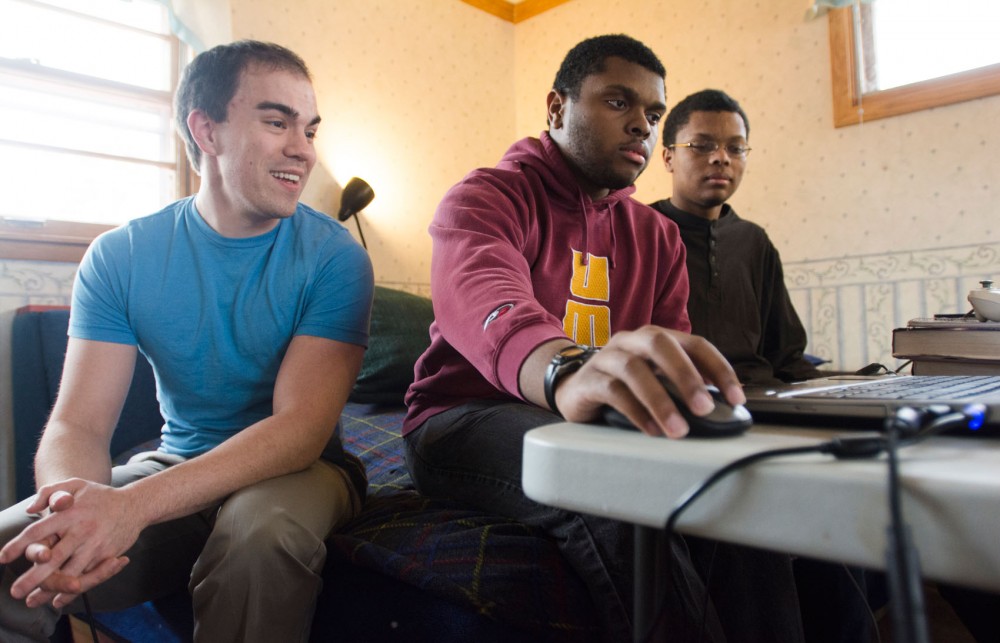University of Minnesota alumni are repairing a glitch in video game-design infrastructure.
Nicolaas VanMeerten and Evva Kraikul co-founded Glitch, an organization that aims to create a community for video gamers and educate them on career opportunities in the field. The organization’s second annual networking convention, called GlitchCon, is this weekend at the McNamara Alumni Center.
VanMeerten said he and Kraikul started the group after attending other video game clubs as undergraduate students. Glitch started as a student group in 2010, but it turned into a nonprofit organization in 2013.
“When we originally started Glitch, it was really about community outreach for students … and then we really recognized there’s a problem here locally and nationally,” Kraikul said. “Students don’t have any resources here, period. There’s a couple of resources here on campus, but there isn’t anyone that’s really helping students find job opportunities or networking opportunities.”
Three main gaming events hosted by the group occur each school year: “Welcome Geek” in September; “GameCraft,” a 48-hour game design event; and “GlitchCon,” a convention that highlights the local video game scene and careers in game design.
GlitchCon will have panels, workshops, student exhibits and an open gaming area, among other opportunities for attendees to meet professionals.
“Students and also the general community can come out and get to know each other and hopefully learn a thing or two,” Kraikul said.
About 600 people attended GlitchCon last year.
VanMeerten said two problems exists in Minnesota: a lack of jobs in game design and a lack of awareness regarding the availability of careers in the field. He said people sometimes forget that opportunities exist in less obvious areas, such as marketing and writing for video games.
Next year, the group plans to open its own building on the West Bank campus, which will host local studios that may hire students. Kraikul said she hopes the transition inspires and prepares students to potentially open up their own studios in Minnesota.
Charles McGregor, a computer science junior at the University of Minnesota-Duluth, attends Glitch events throughout the year. He began attending Glitch events as a senior in high school with his brother Steven McGregor, who was a University student at the time.
“[At Glitch events], I saw there were a ton of like-minded people that were interested in the same thing I was, and that was really inspiring to see that,” McGregor said.
Glitch also helped McGregor by promoting his game, “Glitch in the System,” at places such as the group’s state fair booth. At GlitchCon, the exhibit “Minnecade” will feature local designers, including McGregor.
McGregor is also working on a video game titled “Fingeance” with his brother Steven and alumnus Lane Davis.
Davis, one of the original five members in the Glitch student group, said the organization’s community takes away the commonly felt loneliness that people associate with working on a video game. And besides companionship, he said, collaborating makes it easier to do the work.
“I’ve always been interested in games, but I’ve never really had a push to do it myself. Finding like-minded people who were very, very into games and actually interested in making them led me to do it,” Davis said.
Similarly, alumna Brianna Powers found her career path through Glitch.
“I write for games, which is pretty neat,” Powers said. “It was never a thought in my mind. I’m a creative writer — I always thought I’d be a novelist. Then I joined Glitch and started talking to people. …I put two and two together and thought, ‘Oh, maybe I can write games!’”
Powers then interned as a writer for Blizzard Entertainment, which is most famous for producing World of Warcraft. She also worked as a contract writer at White-Out Studios, a local game studio.
School of Journalism and Mass Communication professor Seth Lewis started the course “Digital Games, Sims and Apps: Storytelling, Play and Commerce” last fall. While designing the course, Lewis sent a copy of the potential syllabus to Glitch for the group to provide feedback.
Lewis said he views his class and the organization as mutually reinforcing.
“I think what you’re seeing is this broad diffusion of gaming in society and, as a result, an increase in interest in understanding what role games have to play in society. In other words, are games simply for fun, or are they also forms of entertainment that should be analyzed?” Lewis said. “There’s a corresponding question, what can students do with that?”
What: GlitchCon
Where: McNamara Alumni Center, 200 Oak St. SE, Minneapolis
When: March 28-29
Cost: $30-80








